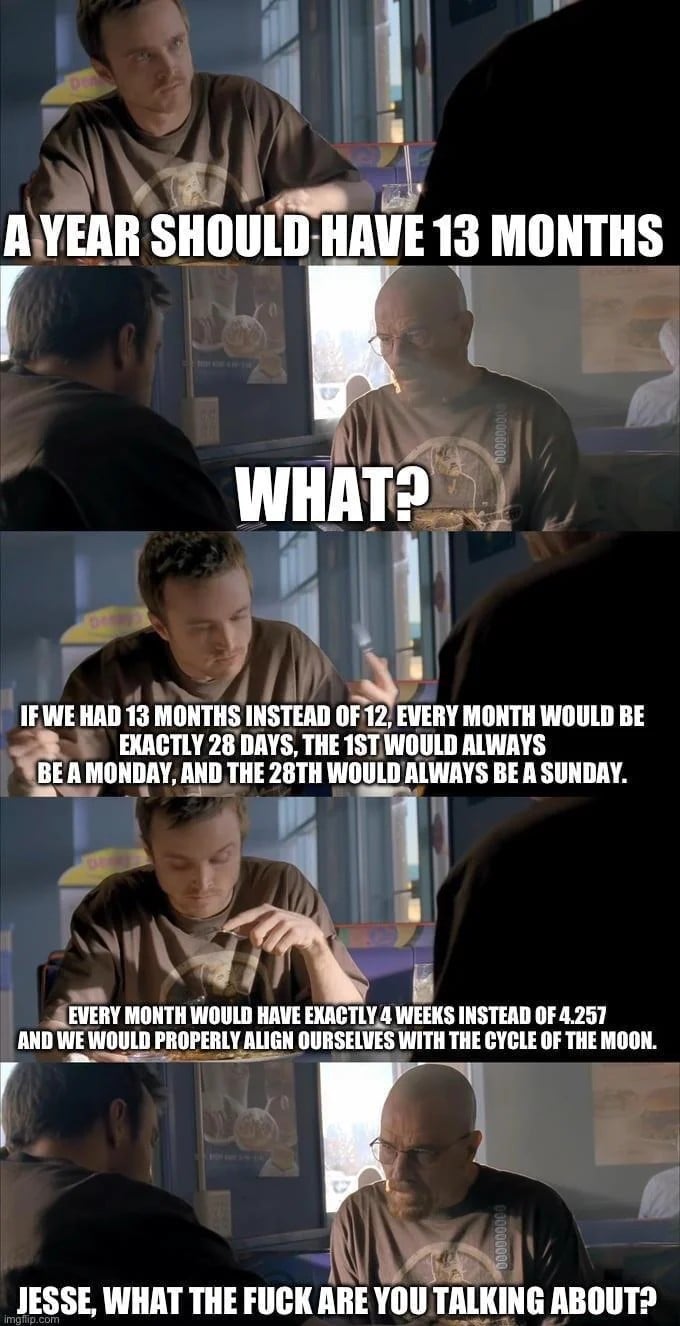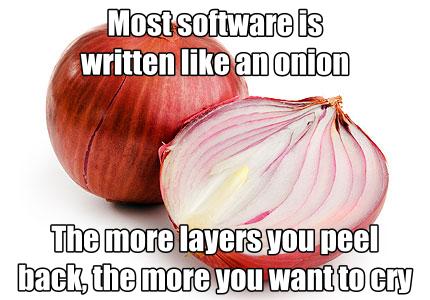No different than any other project the PM/PO team cooks up. Tons of work for no user base.
Why… why is the world like this?
Because the world is seen and directed by layers upon layers of abstractions that get divorced from reality but do give monetary benefits when manipulated in some way.
Sigh… too true.
Our sorrow, despondency, and terror are their sustenance.
Not true, space agencies will use it… once.
until they lose a multi billion dollar mission because of conversion errors
It’s pretty much a requirement now to use the metric system for everything.
Imagine if Americans use a different unit system for time 😱
Unix is for commies. We’ll run our clocks the way Britain ran its coinage! 32 shillings to the third hour, four hours in a pound, 4.3 in a guinea. And of course 10 shekels in a pound, 7 to the guinea. To account for relativity of course.
Show me one flaw. Freedom time bitches!
Ok so now they must split it all into 10 timezones? 😂
I will use moontime. Anybody wants to schedule bullshit meetings will have to commit to figuring out when actually works for them.
deleted by creator
Based on a completely superficial review there are three almost guaranteed ways to become unhinged; studying infinities, refactoring legacy code, and working with timezones.
deleted by creator
I think it’s time for a refactor of my legacy code that deals with infinite timezones. :/
That’s a good idea! Instead of discrete timezones, let’s have continuous timezones!
I’ve been a proponent of this for ages. It makes no sense to cross some imaginary line and suddenly time shifts. Time should change constantly as you move east or west, up or down. Everyone has their own personal time, which is constantly updated.
Bonus: no more daylight savings switch.
How do you agree on a meeting time with a group of people who all live in different places of your country?
That’s another benefit: no more meetings.
Not even to spend good times with friends?
That was kinda the situation in the past: Every town would have its own time, synced to the local noon every once in a while as the precision of the church or townhall clock demanded. That stuck around until railroad operators and passengers got sick and tired of dealing with the timetables that produces.
I had to refactor legacy date/time code (including timezone code) at work. D:
You poor soul
Lmao I love how he just gets more and more flabbergasted throughout the whole video. Truly an accurate depiction of dealing with timezones (which I’m unfortunately dealing with right now!)
Here is an alternative Piped link(s):
Watch Tom Scott descend into insanity discussing time zones
Piped is a privacy-respecting open-source alternative frontend to YouTube.
I’m open-source; check me out at GitHub.
We’ve gone too far. Everyone just switch to UTC please. Yes, it means some will go to bed at 2pm and get up at 10pm, so what.
go to bed at 2pm and get up at 10pm
While we are making reasonable demands, stop using 12 hour time. Sincerely, everyone else.
And please, get all countries to actually start properly accepting ISO 8601 format for dates as a mandatory universal standard…
Obligatory reference: https://xkcd.com/1179/
tldr - you’ll just have to do the conversions in your head now because it’s useful to know where the sun is at different points on the earth when trying to communicate across those points.
Maybe this freak should just text uncle steve whatever he wanted, or a “call me when it’s convinient” message, and then steve will probably see the notification at some point in his morning routine before too long. If this guy really needed to call steve anyways, for whatever reason, he shouldn’t care about time zones, because it’s an emergency.
If you were commonly calling whatever place you were calling, you’d probably be able to intuit what time they woke up anyways, so it’s all moot.
I dunno. I think it’s pretty easy to make a big deal out of time zones and calendar measurements and whatever but I don’t think it really, actually matters that much, because the main thing they facilitate is communication. Time zones and timelines should be engineered more around the human condition, I think, than around anything else.
But then, I think, to construct anything around the human condition is kind of paradoxical. If you create a schedule, then you have created a schedule. I.e. if you construct time, then you imply the existence of something that needs to be measured. That implies deadlines.
Frankly, that’s too much pressure for me, so I’m going to take the more controversial stance here: Abolish time. No more time, no more numbers measuring when I should do what. You’re either gonna tell me whether or not to do something now, or to do it later. The people gotta learn that time is more subjective and contingent, and they gotta start showing up to their work shifts whenever they want to make money, instead of just showing up at a given time when the fuckin steam whistle goes off like it’s the 1800s.
I can get behind that
Obviously it would require some getting used to, but already people can’t comprehend time zones, so that won’t change. My grandma called in the middle of the night all throughout our three year stay in Australia.
It’s gonna get much worse when you start to try mapping days of the week onto the new times. Are days gonna be the same everywhere as well, to stay from 0 to 24? If so, have fun saying things like “Let’s find a time on Wednesday/Thursday”. People likely couldn’t be bothered and would probably just use the day that their normal wake-up time falls on to mean the full solar day instead. At which point you could also just say okay, weekdays are still following local solar days. But now what weekday is it halfway around the world? Now you need to look up their solar day.
All this to say - abolishing time zones will introduce the reverse problem for every problem that it seemingly solves. You can’t change the fact that our planet rotates and people in different locations will follow different schedules. Turning the lookup-table upside down is just a cosmetic change that doesn’t remove the situation that’s causing the confusion. I’d rather just stick with the set of problems that we’re already used to dealing with.
Fair point!
People comprehend days, they comprehend that their day starts at 00:00 and ends at 23:59. Calling to the other side of the world isn’t something most people.do on a daily basis
Not even that. I’m sure you’ve heard “it’s tomorrow when I’ve slept”, no matter what the clock says. Switching terms at midnight will cause confusion more often than not.
Are you high or just not reading what you’re writing? Are you literally claiming that people will get confused when days start at 00:00 and end at 23:59, wherever they live in the world? Because literally no one in this world, except maybe you, is confused by that, because it makes intuitive sense.
and you’ve never been up with friends past your bedtime. 🙄
Ohh, she knew.
Lol.
None of the negatives that this troll article name are actual negatives that normal humans have.
Especially the argument for timezones is “I can just Google what time it is in <timezone>”…
You can always Google “what time is it at <location>”
Which only works when timezones exist. Without timezones, the question would need to be “what time of day is it in <location>?”, and you’d get “morning” or “afternoon”. Any answer to that question is inherently more fuzzy than 8:25 or 17:16.
What time is it in Melbourne?
“The Standard Time is 4:05. The time of day is equivalent to 14:15 in your location.”
Wasn’t that hard to solve. And it’s actually more precise, since it incorporates the changing times of sunrise and sundown.
oh so now we’re right back around at time zones again, wonderful.
except now it’s even more fun because there is zero standardization at all, but users are still going to expect for their computing devices to tell them a time that makes sense. Ah, but culture X thinks the day starts “6 hours before sunrise” and culture Y is more “the day starts when the sun is halfway between sunset and sunrise” and culture Z thinks something even more insane. Oops, now we’ve got locale-based time zones. Locale awareness is honestly even worse than time zones because its just so damn unexpected at times. My own computer has a horrifying mix of US and Europe locale settings, and that is already crazy enough.
stupid people will always think everything is just so simple.
oh so now we’re right back around at time zones again, wonderful.
Pretty much. Shows how it wouldn’t actually help a lot. It’s making one thing simpler while making other things more complex. It’s interesting to think about new problems it would bring and how would they be dealt with. And how much worse the solutions would be than the current problems.
Those that propose moving to UTC should take responsibility and take the +12h offset. Why should we let the brits enjoy +0 offset while the rest of the world got the short end of the stick (especially those living in the pacific)?
Sure, I don’t mind. I live in CET.
CEST now…
Obligatory fuck DST
before i let the people win with “summer time all year”, i am ready for the 12h offset in the 24h system
If it makes a dev’s life easier there’s no reason not to upend half the planet.
In Europe we’ve been talking about ending DST for years now and it hinges on countries deciding which zone they want to adopt permanently. Why can’t they decide? Because the notion of getting up at six and having lunch at 12 is stronger than the cosmic fact of the sun being in the middle of the sky. We just need to decide how we want daylight to fit into that grind.
I say fuck that. If we can’t decide, don’t. Since we’re changing everything anyway, going to UTC will force everyone to think how THEY want to live their lives. When to open stores, whether to move opening hours in winter or summer, when to go to work (both early birds and night owls are great).
Plus in today’s globalized world, 14:00 will be 14:00 everywhere. You decide for yourself if you’re working then or not if somebody sends a meeting request halfway across the world.
Britain: hey guys let’s just use my time k?
Europe: Fuck you.
No, 14:00 will be 2pm in freedom land.
Fuck em, send them 24h times and let them figure it out.
Why switch? It’s not too complicated a concept for the average person to understand and deal with. In fact, it’s intuitive. Sure in software the logic has a few nuances that are a bit complex when needing to deal with local time and timezones, but that’s why we make the computers do the tricky work.
Personally, I think it’s just easier. Yes, computers and stuff, but we’ve perverted local time long ago with DST and country spanning single time zones, so might as well use one global zone and get rid of the confusion altogether.
required reading: https://www.youtube.com/watch?v=-5wpm-gesOY
That’s all good info and explains some of the problems that could be resolved for us programmers if we were on UTC, but for the most part these are programmer problems and the computer handles it for everyone else. Additionally, it makes a few issues clear that won’t be resolved with a UTC switch.
First, as mentioned countries all over the world decide for themselves what timezone they’re going to follow. Even if countries were to switch to UTC, we know they all won’t do it nor at the same time, so programmers will have to deal with that added complexity too having some on UTC, some off, some switching on this date or that… if the movement got serious we’d have another Y2K frenzy, but not one that ended on a specific date… it’d linger for years as various countries came on-board. Additionally, we’d still have to deal with all the historical calendar, timezone and DST switches he mentioned. Those wouldn’t go away… in fact we’d be introducing a bunch of new ones.
Fact is timezones are understandable and work pretty good for normal people and their day-to-day tasks. Normal people aren’t going to want to understand UTC and then have to translate their normal day times to and from others around the world. No matter where you are I understand what you mean when you say your morning started at 6am or you eat at noon or you go to bed at 11pm or 23:00 for that matter. With UTC I don’t know what 23:00 means in Australia, Germany or India relative to your day… not only programmers but even normal people would have to know how to translate that to a time they can relate too, so you’d have to know timezones anyway. So while I’d know 23:00 was exactly the same point in time for each of us, I wouldn’t know how it relates to your day the way it relates to mine… is it morning, night, mid-day? It would actually make today’s programmers problems - which isn’t too common for most of us - a problem for everyone.
I’m just saying, but we did.
Pretty much every electronic thing you own that resembles a computer (phones, tablets, laptops, desktops, even your damned TV) uses UTC. Every. Single. One. Translates that time to “local” whenever it needs to.
So when your TV goes from 9:32 to 9:33, is just showing the converted time from UTC each time.
Almost every device on the planet is keeping time in UTC.
Just because you don’t see UTC time on your device, doesn’t mean that’s not what’s happening. I had an issue where I needed to get into my computer’s bios for something, as soon as the BIOS loaded and showed the time, it was “wrong” because it was in UTC. I’m sure plenty of newer BIOS dialogs are configured to account for timezones now, so yeah. I might be unique in this. It’s still there.
Almost all computers count time as seconds from the epoch (midnight 1/1/1970). That then gets converted into a readable time, which may go through UTC to be converted first, but that’s not how it’s storing it.
You’re referring to UNIX time. And you’re correct.
It’s a count of how many seconds from midnight, January first, 1970, UTC.
Local computers update that time, still in UTC, from time servers, usually over NTP, then translate that time reading from UNIX time in UTC, to a human readable format in the local time zone.
All computers are still keeping track of time from Epoch in UTC.
Unix time is far less universal in computing than you might hope. A few exceptions I’m aware of:
- Most real-time clock hardware stores datetime as separate binary-coded decimal fields representing months, days, hours, minutes, and seconds as one byte each, and often the year too (resulting in a year 2100 limit).
- Python’s datetime, WIN32’s SYSTEMTIME, Java’s LocalDateTime, and MySQL’s DATETIME similarly have separate attributes for year, month, day, etc.
- NTFS stores a 64-bit number representing time elapsed since the year 1601 in 100-nanosecond resolution for things like file creation time.
- NTP uses an epoch of midnight 1900-01-01 with unsigned seconds elapsed and an unusual base-2 fractional part
- GPS uses an epoch of midnight 1980-01-06 with a week number and time within the week as separate values.
Converting between time formats is a common source of bugs and each one will overflow in different ways. A time value might overflow in the year 2036, 2038, 2070, 2100, 2156, or 9999.
Also, Unix time is often managed with a separate nanoseconds component for increased resolution. Like in C
struct timespec, modern *nix filesystems like ext4/xfs/btrfs/zfs, etc.
as soon as the BIOS loaded and showed the time, it was “wrong” because it was in UTC
Because you don’t use Windows. Windows by default stores local time, not UTC, to the RTC. This behavior can be overriden with a registry tweak. Some Linux distro installer disks (at least Ubuntu and Fedora, maybe others) will try to detect if your system has an existing Windows install and mimicks this behavior if one exists (equivalent to
timedatectl set-local-rtc 1) and otherwise defaults to storing UTC, which is the more sane choice.Storing localtime on a computer that has more than one bootable OS becomes a particularly noticable problem in regions that observe DST, because each OS will try to change the RTC by one hour on its first boot after the time change.
That’s a nice theory, it would be a shame if I was only running Windows 10 on my desktop.
Spoiler: I am. No Linux or any other os or bootloader in sight.
That’s strange. As far as I can tell from any web searches, every version Windows still defaults to storing local time to the hardware clock and there are no reports of that changing with an update, nor is there any exposed setting control to configure this behavior outside of regedit. If you’re curious enough, you can check the current setting in the registry at
HKEY_LOCAL_MACHINE\SYSTEM\CurrentControlSet\Control\TimeZoneInformation. Windows maintains the current time as UTC if and only if the RealTimeIsUniversal key is present and nonzero.I expect it’s more likely some other issue would make the BIOS display an hour that’s inconsistent with your local timezone. For example, maybe a bug in the BIOS, maybe a timezone offset setting within the BIOS, or maybe a dead clock battery.
I’m not a typical example. I can check that reg setting later. My PC is a Dell precision 7910 rack that I picked up second hand, running Windows 10 Pro that I self installed.
It’s joined to my homelab active directory domain which has a gpo for setting NTP. I don’t believe I’ve set any additional settings for time via policy.
The system is also set up for virtualization. I’m pretty sure hyper-V is installed and I have VMware workstation installed as well (I mainly use workstation for VMs).
The main disappointment I have with this system is split between the limited GPU space and the BIOS, neither of which I can do much about. The GPU issue is that the rack orientation of the system doesn’t allow much room for a GPU to breathe so even a “good” GPU can’t really get airflow, unless it’s a blower style; I don’t have the money to be picky about my GPU and I was donated an RTX 2080 Ti founders edition, which is definitely not a blower style cooler. Without hardware hacking the system, the card thermal throttles very quickly and doesn’t get very good performance numbers. IIRC it was measuring around the same performance of a GTX 1060 or so. I moved the GPU out of the case temporarily using a PCIe riser which solved the immediate concern, and I’ll be doing some minor modifications to the chassis to make it a more permanent option.
The BIOS issues are mainly that the tuning options either don’t exist or are extremely limited. The BIOS will tell you about the CPU/RAM speeds and features, but won’t necessarily give you options to change anything. I want to adjust my numa configuration on the unit, to better match the hardware so my os makes better threading decisions, but such options are unavailable through the normal means and I haven’t dug into the Dell command line tools for the BMC/IPMI which may be able to adjust the settings. For anyone familiar with numa, what I’m seeing is that my first, say 80% of CPUs are all in one numa node, and the last eight are split. As in, the first 80%+ are in both, the next 4 cores are in numa 0 and the last 4 are in numa 1. I have 2x14 core xeon CPUs with HT, so having 20+ pCores in both numa nodes is creating some interesting stuttering issues. They’re not super frequent, but they happen when the system is busy.
To my recollection, I have not run any of the windows 10 cleanup scripts available around the internet, mainly because I’m a tech and I don’t like not knowing what’s happening/changing on my own system, though I did make a string of changes when I first installed Windows 10 related to optimizing for SSDs and other performance improvements. All performance based, nothing to do with the time.
Beyond that, it’s a pretty typical Windows 10 professional install running on workstation hardware.
But would the moon work on a 24 hour system at all?
I can’t believe I just typed that as a serious comment
Didn’t Bajor have a 28 hour day? I’m now voting for Universal Bajoran Time
If you’re setting moon time to the day/night cycle of the moon, yeah, it would actually have a much longer day, from what I understand.
I might be wrong, but to my best understanding, the moon is tidally locked to the earth, meaning the same side of the moon is always facing the surface of our planet. Which means the rotation of the moon, and the length of a day on the moon would be tied to how fast it orbits the earth.
You can tell the duration of an orbit by simply following the moon cycle (“new” moon (midnight) through “full” moon (noon) and back to a “new” moon. Based on this, unless I’ve made a serious error in my logic, a moon day would be something like 20-30 earth days.
If I Google it, the moon orbits earth approximately every 27.3 days. Which is about 665h 12m… Give or take a few hours.
Our entire concept of time, days, months, and years, breaks on the moon. On earth, an hour is 1/24th of a rotation of the planet. A day is one full day/night cycle, a year is one orbit around the sun.
When you transpose this principle to the moon, am hour is 1/24th of a rotation of the moon, which happens to be 1/24th of a year, which is one orbital rotation around the earth. So one day = one year on the moon.
So how do we measure time on the moon in a way that isn’t completely insane? The only logical thing I can think of is to fundamentally lock the time zone of the moon to the earth. That the date, and maybe even the time, isn’t based on the moon, but rather transposed from some definition of the same on earth.
This also leads me into a rant/discussion about time in SciFi. Once you leave the orbit and reference point of Earth, what is a day? An hour? A year? You have no point of reference to base such notions of time. Why is there a “night shift” in programs like Star Trek? Why is there really only one captain? Why does everything on these shows seem to occur during their idea of “daytime”?
Then there negotiating with some alien race and say they’ll reconvene tomorrow about something… Tomorrow, based on what? You’re in space. It makes sense if they’re in orbit of a planet, but then you get to see standoffs in the middle of fucking nothing, and they’re like “you have 24 hours to decide”. Okay. 24 hours based on what exactly?
I appreciated MiB’s take on this in the film. They defined not only how much time they had to return the galaxy, but in what format the time was being counted in. Which they could calculate and adjust to earth time.
This all sets aside relativity, since when you’re moving near, at, or beyond the speed of light, you experience time differently (see: interstellar), also gravity can affect this, and other factors. But somehow, they just side-shuffle from the whole time thing and just focus on the drama of it all. Viewers are too enthralled with the spectacle, not realizing that these Romans or boleans, or Klingons, or cardassians, or whatever, probably have a completely different idea of how much time their version of “one hour” or “one day” is.
It’s fascinating and frustrating.
I love it and hate it all at the same time.
Time sucks. It’s never correct, often ignored, and bluntly, a strange concept that isn’t, IMO, well defined. We have the idea pretty well set up here on earth, based entirely on things happening on and to this planet, but if you take that reference point away, everything collapses.
Honestly quote irrelevant. It’s hidden away. It’s not shown to us. It could use literally any frame of reference, like farts since the beginning of times, if it’s converted for you, then it’s not.
I’m still technically correct. And we all know that’s the best kind of correct.
Because it makes getting an intuitive sense of what solar time it is somewhere harder.
Can I call my grandma in a different country? Hmm what time is average midnight there. Okay 8 (so far, same thing as looking up a timezone), and it’s 18:00 now, so 10 hours after midnight, which is like my 23:00. Needlessly complicated with extra steps for the average person.
Sure, you can say, I’ll call you X and that will mean the same thing everywhere, but does not have any information about solar time. And these days, it’s automatically converted if you use a calendar (which you should). This is the point of programming, to make the USERS life easier, not the dev. The end is more important than the means, I think we can agree.
Or: what time is it where my grandma is? Okay, cool, I have a sense of what that is immediately after knowing the answer.
There are reasons we do things this way. Working roughly to solar times has more benefits than being able to say a time and it mean the same moment everywhere.
I say we leave things the way they are, works okay.
Like when i find a recipe that measures volume in Cups, weight in Stones and temperature i Fucks?
Could you elaborate a little, I’m not quite sure how it’s related to timezones
Just ask once what time is midday, and do some math
Which I think we can all agree is more work than what we currently need to.
It’s not just one addition, it’s 2 operations following knowing what time midnight is to understand what the solar time it is: what time is it now, minus what time is their midnight, and then you have to add that back to what your midnight is to get a sense of the time. Or you just start thinking in solar time WHICH IS WHAT WE ALREADY DO.
That’s 2 calculations. Currently we do 0.
Innately knowing what time means in films, talking to people over the phone, going to a new country. It would be a huge pain in the arse.
"They met up at 13:00“ great. So where are they in this film? Forcing exposition where currently you might let it be vague.
People who advocate for one timezone simply haven’t thought it through.
Ohh the “what time is it in films” argument is good, haven’t heard that one before, thanks
UTC does not account for time dilation.
No, TAI
That’s it, I’m only using epoch from now on, that’s enough of your time zone shenanigans
Except the length of a second is different on the moon because of relativity. So even utc is wrong.
UTC doesn’t become wrong, you can either just accept a different pace of the clock, i.e. earth ppl will be ever so late to a meeting or it’s just a different kind of timezone conversion. Better would be to have a single time based on the reference frame of the center of the galaxy and everyone keep there time relative to that.
just use a time based on light?, like meter is based on the speed fo light in the vaccum, or use atomic based times?, like how long take for the hydrogen atom todo something bla bla bla
That’s actually what’s different on the moon. Relativity and all that means that time itself actually flows differently on the moon than it does on earth.
The actual problem they’re working to solve is around timekeeping and GPS applications in different reference frames, but it’s hard to make a short headline about.
When I first saw the news I was thinking “there’s no way atoms vibrate differently on the moon” but you’re right it’s about perspective and I’ve realized there’s no way I’m smart enough to handle timezones on an interplanetary scale. I can only hope that the difference between earth seconds and moon seconds can be expressed as a consistent ratio.
I will gladly use some programming library invented in the basement of a university powered by coffee, and rage.
It’s not too bad. Relativity says that no frame of reference is special.
-
On earth, a second looks like a second, but a second on the moon looks too quick.
-
On the moon, the second looks like a second, but a second on earth looks too slow.
Both are actually correct. The simplest solution is to declare 1 to be the base reference. In this case, the earth second. Any lunar colonies will just have to accept that their second is slightly longer than they think it should be.
If it helps, the difference is tiny. A second is 6.5x10^-10 seconds longer. This works out to 56 microseconds per 24 hours. It won’t affect much for a long time. About the only thing affected would be a lunar GPS.
Galactic center is the frame to use for any space travel.
-
It’s well understood math, but it’s “only” relativistic orbital mechanics.
It boils down to a pretty consistent number, but how you get there is related to the weight of the moon, how far it is from earth, and how fast it’s going.
Since the moon is going different speeds at different places in it’s orbit, the number actually changes slightly over the month.They’re just using the average though, since it makes life far easier. We use the average for earth too, since clocks move differently at different altitudes or distances from the equator.
https://en.wikipedia.org/wiki/Second
The second […] is defined by taking the fixed numerical value of the caesium frequency, ΔνCs, the unperturbed ground-state hyperfine transition frequency of the caesium 133 atom, to be 9192631770 when expressed in the unit Hz, which is equal to s−1.
Do not matter for relativity though, always same change.
So are you saying that a caesium-133 atom observed on both the Earth and the Moon to oscillate 9,192,631,770 times will not represent the same absolute span of time?
So, one observer will see those oscillations happen faster than the other?
Does this have to do with the specific gravity fields of both observers, in that those fields affect how the atom oscillates?
Or is there something else I’m missing?
If special relativity is the answer, all good. I’m an electrical engineer trained in classic physics, so I’ll rest knowing that I’d probably need to study that to understand the time differences.
So, one observer will see those oscillations happen faster than the other?
Not quite. In each observer’s frame of reference, time appears to pass the same; it’s only when you try to reconcile the between two objects that are not at rest with respect to each other does relativity show up.
Basically, when you bring someone back to Earth, the observers will find that their watches don’t match up even though both observers experience time passing the same way as normal (because the oberserver is by definition at rest with respect to their own frame of reference).
TL; DR: Relativity is a pain in the ass and makes no sense in everyday terms.
edit: disclaimer - I am not a physicist and have not taken physics classes in a decade plus, but I do teach science at a college. I’m going mostly on half-remembered lectures and some random one-off discussions I’ve had with my buddy in the physics department over the past few years.
It’s that relativity thing where each person will see the oscillations happening correctly, but when they look at what the other person did, the answer will seem wrong.
The difference is small enough that it really only matters if you’re NASA and building moon GPS. MPS?
I vote for LPS, Lunar Positioning System, vs our Global one.
Yep, and the math gives different results based on if you’re on the moon or on earth.
No the second is still 9192631770 hyperfine transitions of Cs-133 on the moon and that’s the same length of time at least unless you want to severely annoy physicists by implying that the laws of nature aren’t constant throughout the universe. It’s just that from our perspective it looks like time is flowing differently there.
You are correct that if you are on thee moon and have a cs-133 atom with you is second will take that many transitions. And if you do the same thing on Earth, a second will take the same number of transitions.
But things get weird when you are on earth and observe a cs-133 atom that is on the moon. Because you are in different reference frames, you are traveling at different speeds and are in different gravity wells time is moving at different rates. This means that a cs atom locally will transition a different number of times in a second from your point of view on Earth vs one you are observing on the moon.
And it would all be reversed if you were on the Moon observing a clock back on the Earth.
They already have to account for this with GPS satellites. They all have atomic clocks on them but they don’t run at the same speed as clocks that are on the ground. The satellites are moving at a great speed and are further from the center of the earth than us, so the software that calculates the distance from your phone to the satellite have to use Einstein’s equations to account for the change in the rate of time.
Relativity is weird.
It’s like it’s relative…
So, in this case a moon timezone, and more generally a “space timekeeping framework” makes sense because time actually moves at a different speed on the moon, so epoch times wouldn’t actually stay in sync.
If the goal of “time” is to make it easier to reason about simultaneous things, then space makes that way more complicated.
It’s just tricky to condense that into a headline that conveys the point.The concept of “simultaneous” breaks down over relativistic distances too so that’s equally fucked
Yup. So building a system for “how we build time systems in different reference frames” and “define how we relate those to earth” isn’t irrational, just makes for headlines that are either difficult or very misleading.

I suspect that won’t help. The reason the Moon needs a time zone is because of gravitational time dilation, time literally runs slower down here on Earth’s surface relative to the Moon’s surface. A computer on the Moon gains an extra 58.7 microseconds each Earth day, so if you’re programming something that’ll be running on Lunar time you’ll need to account for that.
The point of the lunar time zone is not to have a specific UTC offset like other timezones. The moon would have its own set of atomic clocks, and time could be coordinated with earth based on ratio instead of offset.
They’re not going to be maintaining literal atomic clocks on the Moon for this. They’ll apply a mathematical adjustment to UTC based on what the physics calculations say is happening. The details of that adjustment are what NASA has yet to develop. It could involve subtracting a “leap second” from lunar time at intervals, leap seconds are already used for keeping UTC in sync with the solar time so it’s an established process. Or maybe they’ll just let Lunar time continue drifting relative to Earth, in which case there’ll be a different “epoch” on each.
They probably actually will end up with atomic clocks on the moon, or at least in close lunar orbit. If the plan is to have something like gps on the moon, that’s a first step.
Don’t you dare, I have enough trouble reading 24 hour time.
All we need is a single universal Space-Time map that will tell the time (in any and all formats) at any point in space, taking into consideration, all the events caused by all the forces that cause existence, from the start of this universe. Then it can take the place of both, maps and clocks.
Just make sure it is memory safe. Oh and properly escape all queries. And also …
That should last us until we start exploring the space outside the universe.
From the start of the universe: 1970-01-01T00:00:00Z
What about causality cones?
Lightcones?
My favorite thing here is pointing out that Heisenberg uncertainty should influence gravitational waves and definitely influences light cones
Lightcones
Yes, got that mixed up.
Captain’s log, stardate…
Lol
The proposed time zone is to drift about 1 second every 50 years. I also suspect it wouldn’t really be a time zone in the same sense as the time zones we know - it would just be a standardised calibration reference. Dates and times expressed in “moon time” would probably just be some leap second off of a known Earth time zone, and because it’s mere seconds over centuries, I think the only use of this time zone is to calculate ultra-precise time diffs between two earth datetimes when the observer is on the moon. At least, that’s how I interpret the articles I can find about it.
It’s also important for things like GPS, as related to other planets, as well as orbital maneuvering.
What they’re actually being told to build is “write down the rules for moon time”, which is basically what you said but defined in terms of “this much faster than earth time”, and a system doing the same thing on other planets or places in the solar system.
So it’s less a timezone and more a time system, and instructions for how you calibrate your atomic clock on the moon and reconcile the difference with terrestrial clocks.
Serious question…why would an entirely isolated GPS constellation need to have “a time zone” as opposed to it’s own epoch (like unix)? It’s on the receiver side that all the computation happens, aren’t the satellites essentially just announcing an agreed-upon time? Wouldn’t the client be able to do it’s own comparison of “it’s time”, as long as it’s source of time is also synchronized with the constellation?
I believe, and we’re at the edge of my understanding here, that the satellites need a consistent adjustment for local relativity. Because the satellites also have their clocks tick differently.
So they define a new time standard for the moon so that lunar operations can function based on that time standard, rather than having to recalculate relative to earth.https://arxiv.org/abs/2402.11150
That’s the paper from NIST that’s basically the timezone part of it all.
They’re basically defining how to calibrate moon clocks so we all agree exactly how they differ from earth clocks.
Great explanation, but unfortunately the post in the image OC missed the absolute best part, the parody article.
Nah dog, its gonna be UTC. End of story.
if anything it should be stardate as the united federation of planets agreed to
The moon gains a few seconds every year relative to the Earth due to relativity. Otherwise, yeah, there would be no reason for a new zone.
Its UTC or you gonna have to find a new programmer !
Indeed, God help whoever NASA puts in charge of date and time conversion.
If we do a lot of space travel we’ll have to get used to this, though. And even worse, there’s no consistent way of defining a frame of reference not subject to gravity, so there’s a chance any standard one will fall into a black hole, which is funny because it’s a tangible thing destroying a concept.
This is the way.
So, I read something on this a little while ago. It has to do with the moon’s weaker gravity making time progress at a different rate, so the lunar time zone gives a precise reference for sub-second (nanosecond I guess?) precision manoeuvres and such like.
The time dilation on the surface of the moon would cause a clock to be 20 milliseconds ahead of a clock on earth after one year
it might be easier just to synchronize the space station clock with earth once a month, but I guess NASA would go for nanosecond precision if they could
Sure, we can compromise; they can have their own timezone, but it has a constant time value.
const moonTime = DateTime.Utc.MoonTimeAs in, it is perpetually 4:20 PM on the moon?
nice.
To the moon 🚀 🚀 🚀
That sounds… iffy. Thing is that UTC lags more and more behind TAI as UTC takes the earth’s rotation into account, introducing leap seconds so that all the timezones don’t slowly drift across the globe. Moon people care preciously little about the earth’s rotation around its own axis, more relevant is its own day/night cycle which (because tidal lock) is an earth month. The system might just be stable enough so that UTC can simultaneously sync to that, you’d have to ask an astronomer.
Actually, no, forget it: The moon moves quite fast relatively to the earth’s surface, more than enough for relativistic effects to apply – they also apply to GPS satellites, stuff simply wouldn’t work if those things ran on Newtonian maths. Sooner or later it’s going to need adjustments due to that.
Well TAI stands for International Atomic Time and “international” generally pertains to Earth-bound locations.
Coordinated Universal Time sounds like it has a bigger inclusivity scope
Otherwise we’d have to rename TAI to “Intergalactic Atomic Time”
It’s own timezone? It’ll need it’s own clock. A moon day is about 28 Earth days.

std::chrono::neutronstar_clockThat may make sense if you’re on the surface of the moon, but that’s not the case. The moon time zone is for the moon orbiting space station proposed by NASA
How long is a moon year?
If a year is how long it takes to go around the sun then a Moon year is the same as Earth’s
The Royal Observatory Greenwich:
“Well, as the first to co-ordinate time we-”
The International Telecommunication Union and International Earth Rotation and Reference Systems Service in Unison:
“Excuse me, I think you’ll find we manage the time.”
NIST: “I don’t see your footprints up there! We’re going off my Omega Speedmaster!”
Anyone else keep nearly everything set to UTC?
In the military that’s all we used. It’s called Zulu time in the Army and it makes for coordinating events in multiple time zones fairly easy. I would assume the moon would be the same since there will 100% be a moon base with military.
I have response teams in a “follow the sun” model as well as having my US team spread coast to coast, plus all our clients set their servers to UTC. It makes the most sense to keep something set to UTC at a moment’s glance.
Shouldn’t it have its own time system? And have its own time zones? You can’t give the moon its own single time zone (unless you’re into the idea of a single universal time zone).
That’s actually what they’re doing. The reporting said timezone when the actual order is more about time standards.
They’re creating coordinated lunar time, as a complement to coordinated universal time, so it’s a different time system with details about how it relates to UTC.
https://www.whitehouse.gov/wp-content/uploads/2024/04/Celestial-Time-Standardization-Policy.pdf
Timezones on the moon don’t serve as much function, because the day/night cycle is closer to a month long, and doesn’t map to human rhythms at all. In a hypothetical where we have moon colonies on opposite sides of the moon, there’s no reason for them to not still have synchronized day/night, since it already has no relation to the movement of the sun in the lunar sky.
There’s not really a difference between 0 timezones and 1 timezone, let’s split it and go with 1/2 timezones
I say we compromise we will take the moon but they must give up daylight savings. it’s only fair.
Adds moonlight savings
the fact that the acronym for Coordinated Lunar Time is LTC tells you everything you need to know about how this will work.





































